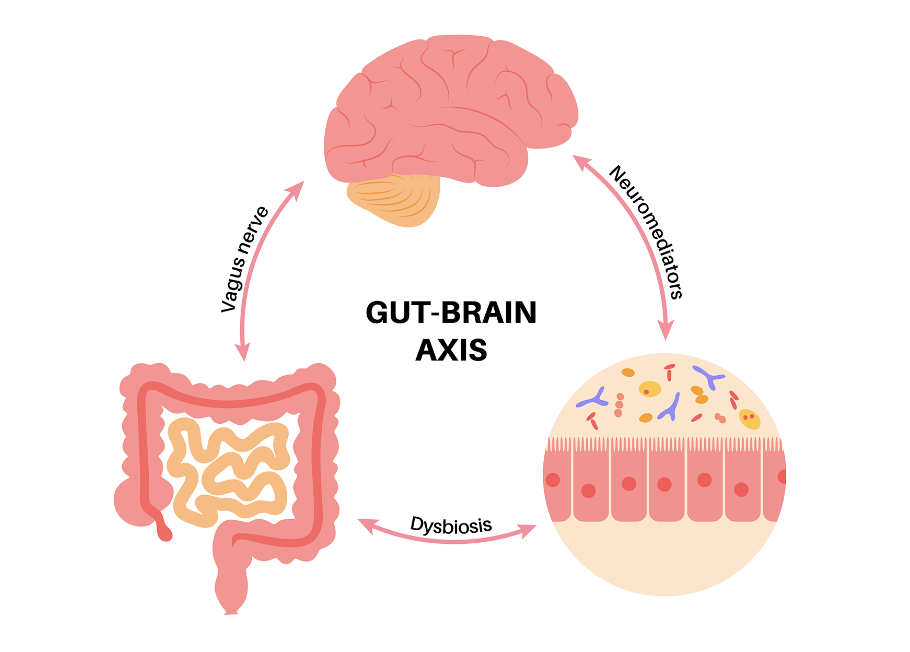The gut-brain axis is an intriguing and complex connection between our gastrointestinal tract and our central nervous system. This bidirectional communication system plays a vital role in maintaining our overall health, influencing everything from our mood to our digestive functions. Understanding the gut-brain axis can open new pathways for improving mental and physical well-being. Here are five essential things to know about this remarkable connection:
1. The Gut and Brain Communicate Constantly
The gut and brain are in constant communication through a network of neurons, hormones, and biochemical signals. This intricate dialogue is facilitated by the vagus nerve, the longest nerve in the body, which directly connects the gut to the brain. Through this nerve, the gut sends signals about hunger, fullness, and even emotional states to the brain. Conversely, the brain sends signals to the gut, influencing digestive processes and gut motility.
2. Gut Microbiota Influence Mental Health
Our gut is home to trillions of microbes, collectively known as the gut microbiota. These microorganisms play a crucial role in our health by aiding digestion, producing vitamins, and supporting immune function. Importantly, they also impact our mental health. The gut microbiota produces neurotransmitters such as serotonin, dopamine, and gamma-aminobutyric acid (GABA), which are critical for regulating mood, anxiety, and cognitive functions. An imbalance in gut microbiota, known as dysbiosis, has been linked to various mental health disorders, including depression and anxiety.
3. Diet Affects the Gut-Brain Axis
What we eat significantly impacts the gut-brain axis. Diets high in processed foods, sugars, and unhealthy fats can disrupt gut microbiota, leading to inflammation and impaired communication between the gut and brain. Conversely, diets rich in fiber, fruits, vegetables, lean proteins, and fermented foods support a healthy gut microbiota and promote better mental health. Nutrients like omega-3 fatty acids, polyphenols, and probiotics have been shown to positively influence the gut-brain axis.
4. Stress Impacts Gut Health
Stress and anxiety can wreak havoc on our gut health. Chronic stress activates the body’s fight-or-flight response, leading to the release of stress hormones like cortisol. These hormones can alter gut motility, increase gut permeability (often referred to as “leaky gut”), and negatively impact gut microbiota. This bidirectional relationship means that while gut health can influence stress levels, managing stress through techniques like mindfulness, exercise, and adequate sleep can also improve gut health.
5. Probiotics and Prebiotics Play a Role
Probiotics are live beneficial bacteria that can be ingested through supplements or fermented foods like yogurt, kefir, and sauerkraut. Prebiotics, on the other hand, are non-digestible fibers found in foods like garlic, onions, and bananas that feed and support the growth of beneficial gut bacteria. Both probiotics and prebiotics play a crucial role in maintaining a healthy gut microbiota, which in turn supports the gut-brain axis. Research suggests that specific strains of probiotics can help reduce symptoms of anxiety and depression, highlighting the potential of targeting gut health to improve mental well-being.
Conclusion
The gut-brain axis is a fascinating and vital aspect of our overall health. By understanding the ways in which our gut and brain communicate and influence each other, we can make informed choices about our diet, lifestyle, and mental health practices. Supporting a healthy gut through proper nutrition, managing stress, and incorporating probiotics and prebiotics can have profound effects on both our physical and mental well-being. As research continues to uncover more about this dynamic relationship, the potential for improving health outcomes through the gut-brain axis remains promising and exciting.

